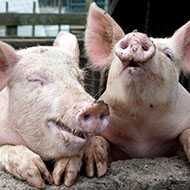
Study will analyse the expressive body language of animals in the supply chain
Leading supermarket Waitrose has teamed up with Scotland's Rural College (SRUC) in a bid to further understand the emotions of animals used in the supply chain.
The pioneering study aims to identify and promote positive expressions of animals' welfare and achieve the best quality of life for farm animals supplying Waitrose produce.
It will be carried out by the Waitrose and Partners Animal Welfare Development Group – an expert panel of vets, scientists and farmers - in conjunction with Professor Françoise Wemelsfelder, animal welfare and behaviour specialist at SRUC.
Key to the study will be the Qualitative Behavioural Assessment (QBA) toolkit, developed by Prof Wemelsfelder to analyse the expressive body language of animals when interacting with each other and their surroundings. The system consolidates the actions, such as 'curious' or 'scared', into a framework that can provide an insight into an animal's emotional state.
Prof Wemelsfelder explains: “For any given species, you need a list of about 20 terms to describe both the positive and negative aspects of the animals’ emotional range. Is the animal relaxed, playful, confident or curious? Is it tense, frustrated, agitated or bored? Then you scale the intensity of this expressivity. It’s bored? Well, how bored? It’s content? How content? The scale starts at zero for ‘not at all content’ and goes up to ten for ‘couldn’t be more content’.”
By scoring a significant number of terms in this way, researchers will be able to identify patterns that can reveal how an animal is generally feeling.
The researchers aim to develop lists of descriptors for pigs, laying hens, dairy cows, chickens, ducks and veal calves. These lists will then be converted into an 'on-the-go' app that Waitrose inspectors can use when visiting farms to ensure a high standard of welfare.
“There is so much knowledge among the farmers already about the way animals express themselves, but a lot of it is implicit and goes unspoken,” continued Prof Wemelsfelder. “The toolkit will formalise this and give people confidence to say, ‘Let’s do something with the knowledge that we have.”
Andrew Booth, chair of the development group, added: “We know that Waitrose & Partners has always led the way when it comes to animal welfare, but what we wanted was to create a framework to assess this welfare, to show what we’re doing well and to identify areas for improvement.”



 RCVS Knowledge has welcomed Professor Peter Cockcroft as editor-in-chief for Veterinary Evidence.
RCVS Knowledge has welcomed Professor Peter Cockcroft as editor-in-chief for Veterinary Evidence.